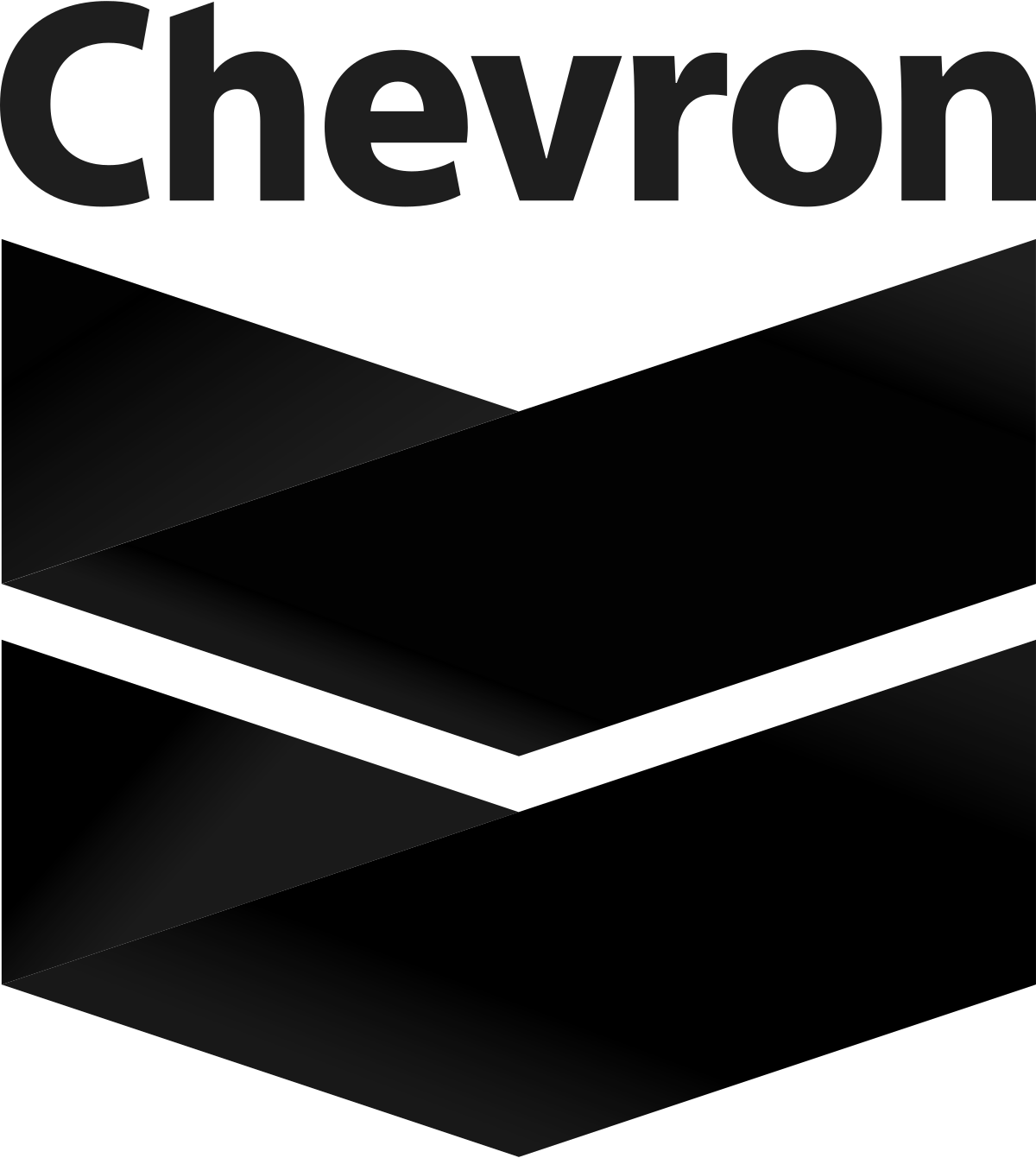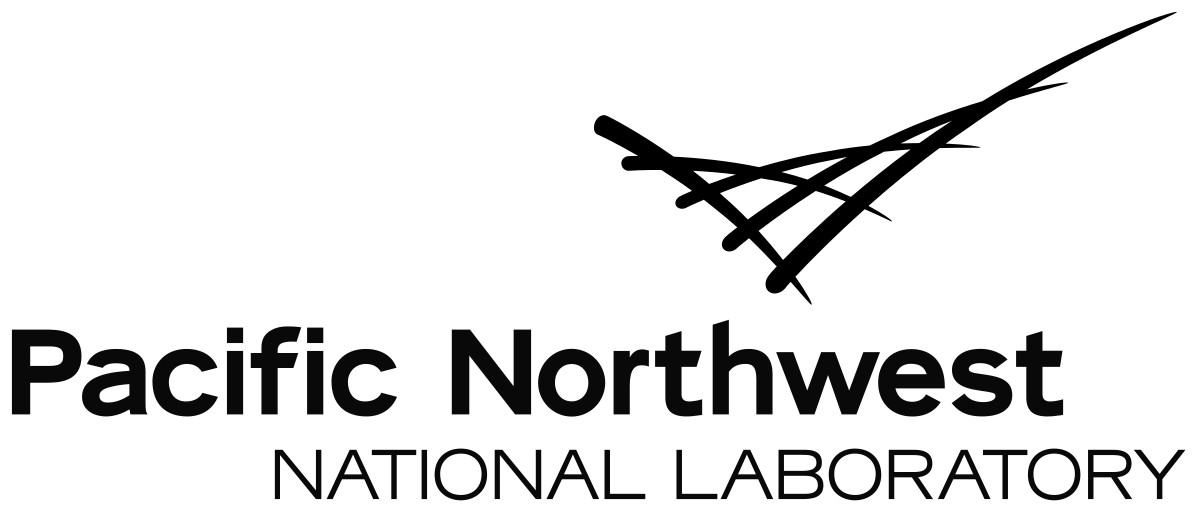
Performance Coaching
Performance Excellence
Performance Coaching
Build Teams (and Cultures) That Can Outperform
Anyone can work on a team, and almost everyone has at some point. Yet only 20-30% of teams are high-performing. The difference is building from an objective measure.
The good news is that we can rely on scientific analysis. Team science tells us what makes great teams great, and what we need to do to shift mediocre teams toward higher performance.
- Fundamental knowledge, skills, and abilities (aligned to the roles and functions the work requires).
- Team processes, tools, and approaches which are aligned to the type of work the team must accomplish (innovative & experimental is different than mechanistic and routine).
- A psychologically safe environment where team lifecycle events (planning, updating, and debriefing) can occur openly, honestly, and transparently.
- Most importantly, interpersonal teaming skills which enable team members to leverage the knowledge, skills, abilities, processes, tools, and approaches which they've selected for their work.
The 7 Drivers of Team Effectiveness1
Teams and the people who compose them are different. Yet research in team science has shown there are seven core drivers of team effectiveness which apply to every type of team.
- Capability: the individual and collective knowledge, skills, and abilities to complete work.
- Cooperation: the attitudes and beliefs about the team.
- Coordination: the right teamwork behaviors at the appropriate time (actions, not beliefs).
- Communication: sharing the right information, the right way, at the right time.
- Cognitions: shared understanding of priorities, goals, work processes, methods - how to do the work.
- Conditions: the environment in which the team works.
- Coaching: leadership, both from designated leaders and situational (functional) leaders.
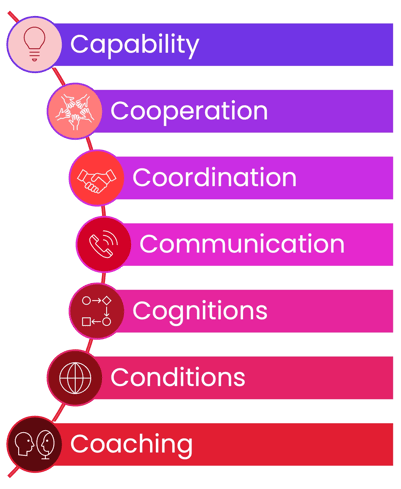

The 5 Team Distinctions1
Additionally, in thinking specifically about how teams differ, there are 5 distinctions research has shown are common in helping examine teams.
- Reliance: the level of interdependence of team members' work.
- Stability: the frequency the membership of the team changes.
- Task Consistency: whether the type of work changes over time, and to what degree.
- Proximity: co–located, hybrid, remote?
- Similarity: do team members have the same expertise, or different areas of expertise?
by Scott Tannenbaum, PhD, and Eduardo Salas, PhD
The Coaching Process
1. Assess
2. Agree
3. Improve
Performance Coaching FAQ
Is Performance Coaching Effective?
Performance Coaching, and coaching in general, is effective in that it demonstrably helps teams, and their organizations, improve performance, learn, and grow. Consider:
"Outstanding teams had significantly more coaching, both from leaders and from one another, than did mediocre and struggling teams."1
"We examined relationships between coaching interventions and several individual-level outcomes that are relevant for both individuals and organizations. The results show that coaching has significant positive effects on performance and skills, well-being, coping, work attitudes, and goal-directed self-regulation. In general, our meta-analytic findings indicate that coaching is an effective tool for improving the functioning of individuals in organizations."2
"Coaching activities (e.g., one-on-one coaching, team coaching and work group coaching with a professional coach practitioner) are rated as the most helpful in achieving the goals of change management initiatives. Addressing leadership style, strengths and blind spots; overcoming resistance; building resilience and change readiness; and finding processes and tools are the most frequently cited reasons for using coaching activities for change management."3
- Jacqueline Peters & Catherine Carr. "Team effectiveness and team coaching literature review," Coaching: An International Journal of Theory, Research and Practice, Vol 6, Issue 2 (2013): 116- 136.
- Tim Theeboom, Bianca Beersma & Annelies E.M. van Vianen. "Does coaching work? A meta–analysis on the effects of coaching on individual level outcomes in an organizational context," The Journal of Positive Psychology, Vol 9, Issue 1 (2014): 1-18.
- Jenna Filipkowski, PhD, Mark Ruth, & Abby Heverin. "Building a Coaching Culture for Change Management." Human Capital Institute and the International Coaching Federation, 26 Sep 2018. Available at https://www.hci.org/research/building-coaching-culture-change-management (accessed 02 Feb 2024).
Do We Need Performance Coaching?
Obviously, we cannot answer this question in our FAQ, but we are fairly certain that you know the answer. If you struggle with organizational change, if your culture is not where you want it, and if your teams (and organization) are not performing to their potential, our return question is "what are you doing to improve?"
If you do not have an answer, that's Ok, but also why you should consider getting in touch to at least learn what is within the realm of the possible.
Where Can Performance Coach Help?
Typically, performance coaching focuses on improving team and organization functioning. This includes areas such as:
- establishing or clarifying goals, outcomes, objectives, and "why" (building alignment)
- improving team ways-of-working through process analysis, domain analysis, debriefing, process improvement, and potentially training
- improving the way teams work together by coaching and training teamworking skills
- identifying organizational impediments to change and performance to leadership
- introducing cultural improvement and change functions with leaders and, often, HRs, PMOs, and change management offices
- training and coaching individuals
Every team, every organization, and every environment is unique. The capabilities that our performance coaching brings are equally unique and are tailored specifically for each client.
Is Performance Coaching Like Mentoring, Training, or Advising/Consulting?
No, Performance Coaching is not the same, although it may incorporate some or all of those disciplines as a part of the coaching engagement when needed. Mentoring, training, and advising are fundamentally different, however. Here are a few definitions which describe the way we approach this topic:
- Training: The transfer of knowledge. The most typical example is traditional classroom-based training, though on-the-job (OJT) training is another common type. The instructor does not need to be an expert in the domain and may not be able to mentor or advise on specific practices. The correct relaying of an established educational curriculum is the only requirement for the conduct of training, though "successful" training (in a holistic sense for organizations) requires more than simply the transfer of knowledge. Training is a normal precursor to mentoring and/or advising.
- Mentoring: The transfer of a particular skill or skills from an experienced practitioner (expert) to a novice. The novice should possess domain knowledge acquired through training. The mentor's focus is the novice's application of knowledge to task accomplishment in the real work environment. The mentor shares expertise and helps the novice contextualize and learn how to apply knowledge during the conduct of work, sharing best practices, pitfalls, and unique techniques which enable the novice to develop specific skills.
- Advising: Also referred to as "consulting" or "coach-advising," an expert in a specific domain or area observes individuals, teams, or other types of practitioners through the conduct of their work and provides advice and/or recommendations specific to their domain of expertise. The practitioner attempts to apply the advice to their work in the appropriate way. Advising may also include providing assessment and/or feedback on various aspects of performance.
Connect today to get started
Every great relationship starts with a conversation.
Getting The Optimal Outputs Requires The Right Inputs + The Right Process
Our workshops leverage complex systems approaches to engage and emerge the best from your people, their collective intelligence, and their experience.
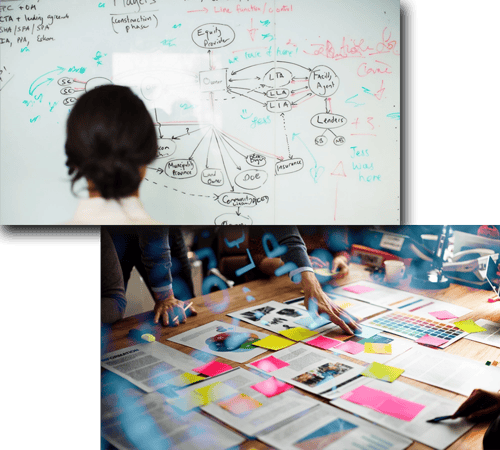
Services
Workshops
Knowledge Transfer is not the only goal. applicability, utility, and retention are critical.
Truly effective training requires careful consideration of the applicability of training to job function and task completion, and should be delivered using experiential methods which promote the direct application of acquired knowledge in work performance. Following with routinized use, feedback, and skill enhancement ensure retention and, ultimately, defines success.
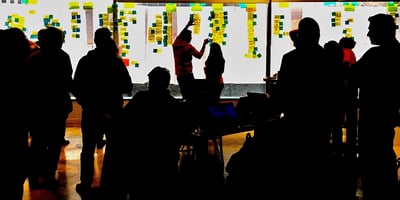
Services
Start the Conversation
